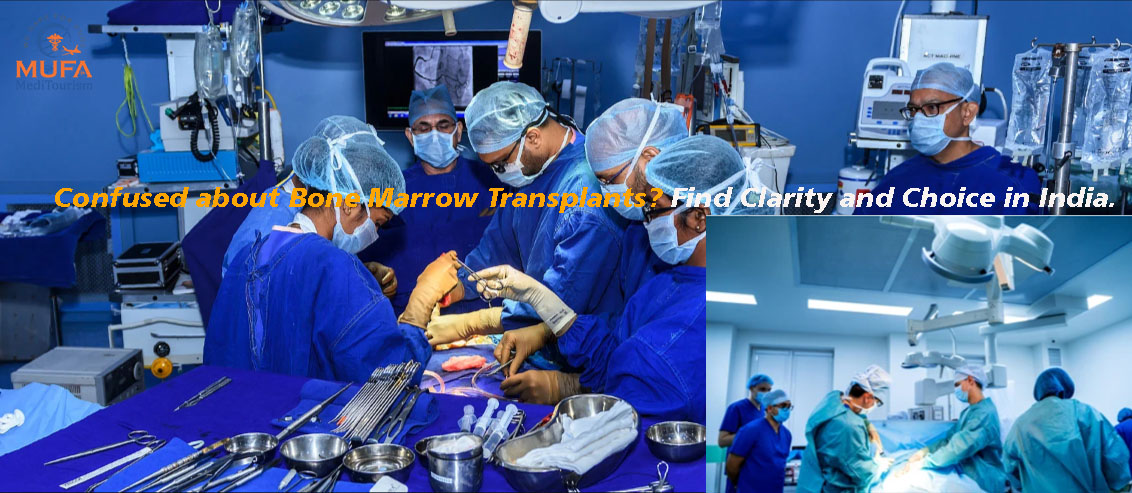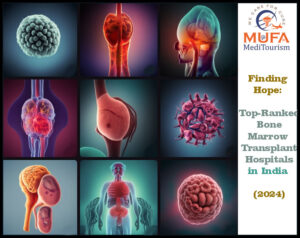Receiving a cancer diagnosis is like the ground beneath your feet crumbling. Treatment options swirl in a dizzying fog, leaving you grasping for answers. If the term “bone marrow transplant” emerges, the fog thickens – questions multiply, anxieties bloom. You’re not alone. This confusing, yet life-altering procedure carries immense weight, demanding informed decisions. And if you’re considering it in India, the landscape holds both promise and complexities. Let’s navigate this journey together, dispelling confusion and empowering you with choices.
What is Bone Marrow Transplants?
Picture your bone marrow as the factory churning out life-giving blood cells, faltering or corrupted. Bone marrow transplants offer a potential reset. Healthy bone marrow, either from a donor (allogeneic) or yourself (autologous), is infused into your body, aiming to rebuild a healthy blood cell production system. This can be a lifesaving treatment for various blood cancers like leukemia, lymphoma, and myeloma, as well as some severe non-cancerous conditions.
Why Consider India for Bone Marrow Transplants?
India’s healthcare sector has soared in recent years. Renowned hospitals like Tata Memorial Hospital, Mumbai, and Apollo Hospitals, Chennai, boast state-of-the-art facilities and experienced oncologists. Moreover, compared to some Western countries, costs can be significantly lower, making treatment accessible to a wider range of patients.
But Hold On, Concerns Linger:
Despite the positives, uncertainties linger. Finding the right hospital with expertise in your specific condition is crucial. Assessing donor compatibility, managing potential side effects like graft-versus-host disease (GVHD), and accessing post-transplant care are critical considerations. Let’s untangle these concerns.
Choosing the Right Hospital:
India boasts numerous excellent cancer hospitals. Thorough research is key. Look for:
- Expertise and accreditation: Choose hospitals with dedicated bone marrow transplant units and JCI or NABH accreditation, signifying international quality standards.
- Success rates and experience: Investigate the hospital’s track record in your specific cancer type and transplant success rates. Transparent data is your friend.
- Teamwork: Ensure a multidisciplinary team, including oncologists, transplant specialists, nurses, and psychologists, work seamlessly to address your medical and emotional needs.
- Infrastructure and technology: Advanced laboratories, sterile transplant units, and sophisticated equipment like cell separators are essential.
Demystifying Donor Matching:
Finding a suitable donor is paramount. Siblings often provide the best match, but unrelated donors through registries are increasingly successful. The Human Leukocyte Antigen (HLA) typing test determines compatibility, ensuring minimal GVHD risk.
Facing the Potential for GVHD:
GVHD occurs when donor immune cells attack your body. While it’s a serious risk, advancements in medications and management strategies have significantly reduced its occurrence and severity. Open communication with your doctor and a proactive approach to symptom management are crucial.
Beyond the Transplant: Embracing Post-Care:
The journey doesn’t end with the transplant. Regular follow-up appointments, monitoring for infections and GVHD, and potential adjustments in medications are essential. Some hospitals offer comprehensive rehabilitation programs to help you regain physical and emotional strength.
Remember, You Have Choices:
Don’t feel pressured into a quick decision. Seek second opinions, ask questions, and gather information. Advocate for your preferences – choose a hospital that prioritizes your comfort and well-being alongside medical expertise.
Finding Support and Resources:
Navigating this journey can be emotionally draining. Seek support from family, friends, and patient communities. Utilize online resources like the Indian Cancer Society and international organizations like the Bone Marrow Transplant Foundation.
A Ray of Hope:
Bone marrow transplants, though complex, offer a beacon of hope in the face of challenging conditions. India’s evolving healthcare landscape provides access to this potentially life-saving treatment. By embracing knowledge, making informed choices, and connecting with the right support system, you can walk this path with courage and clarity. Remember, you are not alone in this journey – empowered with knowledge and support, you can reclaim your strength and navigate towards a brighter future.
Additional Resources:
- Indian Cancer Society
- Bone Marrow Transplant Foundation
- American Cancer Society
- National Cancer Institute
This blog post is merely a starting point. Knowledge is your armor, so keep researching, asking questions, and advocating for yourself. With the right preparation and support, you can face this challenge with confidence and emerge stronger on the other side. We wish you all the best on your journey.
Explore more about your options with Mufa MediTourism:




